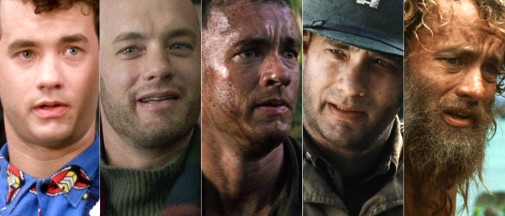by Cláudio Alves
 Tom Hanks has been nominated five times before. Can he get his sixth nod for playing Fred Rogers?
Tom Hanks has been nominated five times before. Can he get his sixth nod for playing Fred Rogers?
There was a time when I considered Tom Hanks one of Hollywood's most overrated actors. For years, his consecutive Oscar wins were the nadir of the actor's undeserved success, a symbol of the Academy' unfairness. In Philadelphia, he was overshadowed by a more awards-worthy Denzel Washington and, in Forrest Gump, he managed the impossible feat of being even more annoying than the rest of that insufferable Best Picture-winner. Worst of all, Tom Hanks had become something of a personal synonym for boredom.
I'm not proud of my youth's distaste for the actor, even though I still hold a negative opinion regarding his Oscar victories. The rest of my dislike, however, has vanished into thin air. I can pinpoint the exact moment when such growth occurred. When the clouds of skepticism parted, they illuminated the path by which I'd become a passionate fan of Tom Hanks, one of contemporary Hollywood's best actors…

It happened in November 2013, in the rainy hours between classes and the nightly screenings of the Lisbon & Estoril Film Festival. I had time to kill and Captain Phillips, which had opened two weeks before, was perfectly fitted to fill that hole in my schedule. As you can imagine, I'd avoided the film because of the dreaded Hanks but the Oscar buzz made it an unfortunate must-see. So, I watched it and, by the end, I found myself gobsmacked.
I remember crying along with Tom Hanks onscreen, sobbing. This actor I had spent so many years undervaluing had taken my breath away with an explosion of painful vulnerability, the likes of which we seldom see from American leading men. It was trauma materialized in the form of a trembling wreck of a person, covered in another's blood and unable to cope. It's easy to reduce Tom Hanks' performance to those last few minutes, but the entire work is worthy of praise, solid and astounding, essential to the creation of tension and compassion that the film exploits so well.
Without Hanks, Captain Phillips wouldn't work and I doubt it would have scored six impressive six Oscar nominations, including Best Picture. Weirdly enough, Hanks wasn't among the nominees. He had been nominated for the Golden Globe, the BAFTA, the SAG, the Critics Choice Award and a myriad of other honors, but not for the Oscar. One would expect a two-time Academy Award winner starring in a Best Picture nominee would be an automatic lock, but Hanks seems prone to defying Oscar punditry.

2013 also saw Hanks as Walt Disney in Saving Mr. Banks. In it, he managed to walk the line between celebrating the icon and demystifying it, complicating what could have been an empty gesture of corporate propaganda. Hanks' Disney is a pushy businessman who isn't used to hearing no for an answer. He always has a smile on his face, but there's a crassness to the way he gives pre-signed photos to fans and the way he tries to hide his impatience. It's by no means groundbreaking work but it's much better than that year's Best Supporting Actor winner.
What initially was a strange anomaly in the History of the Academy and Tom Hanks soon devolved into an alarming pattern.
In 2015, Hanks reunited with Steven Spielberg for Bridge of Spies. Like Captain Phillips, it was nominated for 6 Oscars, including Best Picture, but its lead wasn't among the nods. Then came Sully, a movie that looks to have been engineered to win as many Oscars as possible, but ended up with a single nomination for its Sound Editing. Nothing for Tom Hanks' subdued work, which manages to dismantle the idea of an hero and reveal the traumatized miasma of self-doubt beneath the facade. With The Post, in 2017, Hanks added another Best Picture nominee to his resumé without a Best Actor nod.

Most frustratingly, this sudden draught of Academy affection coincided with my growing love for the actor. The one-two punch of Captain Phillips and Saving Mr. Banks (plus all the other great performances) propelled me to reevaluate my solidified opinions on the actor, rewatching older films and looking for ones I'd never felt compelled to see. What I discovered was an actor that's a master at playing that most elusive of characters - a genuinely decent person. Such roles can be difficult to make into interesting personalities, but Hanks knows how to shade goodness with melancholy and the glint of hidden sharpness. It's amazing, but easy to ignore when you are not looking for it.
My younger self wasn't looking for it and, apparently, neither does today's Academy. Maybe that's why he hasn't been nominated in almost 18 years. Another reason can be how easy Hanks makes it all look, how he hides the seams and never turns the effort of performance into something visible. The roles themselves also tend to be rather modest in script-form, before they are complicated by his deft performances. What makes Tom Hanks a great actor is, in a way, what makes him such a difficult match for Oscar's usual perception of an awards-worthy feat of acting.

Maybe A Beautiful Day in the Neighborhood can change that. I haven't watched the film yet, but, even so, I hope the Academy remembers how brilliant Tom Hanks is. At least, it'd be lovely if one of my favorite actors could have an Oscar that he deserves and represents the sort of work that has made him simultaneously so masterful and so easy to underestimate.